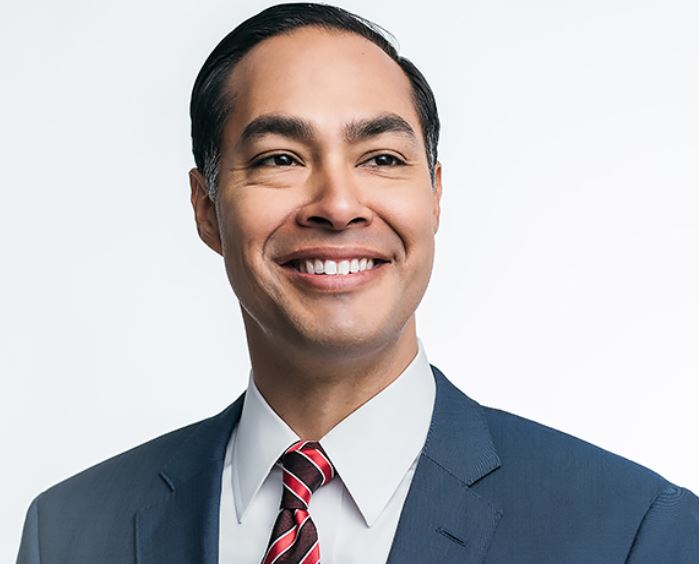“There were many times along the way on the campaign trail where I felt that my presence in the race had a particular meaning for so many young Latinas and Latinos, who have not seen themselves reflected on the presidential campaign, and my hope is that, as they saw that, perhaps some of them dreamt about running for president themselves one day and were inspired by it,” says Julian Castro, former presidential candidate and former Secretary of the Housing& Urban Development department during the Obama administration.
Secretary Castro sat down with the Thomson Reuters Institute to share his perspectives of the key economic challenges facing low-income Americans and how he continues to advocate for policy solutions.
The People First agenda
From the moment he announced his candidacy for president, Secretary Castro focused his platform on what he calls a “people first agenda” that spans many policy areas, such as housing, food insecurity, and poverty, knowing that the issues had been negatively impacting many in the U.S. for decades. Now, he continues to advocate for solutions to these and many more challenges that people in disadvantaged communities across the U.S. face on a daily basis.
“I fundamentally believe that in the United States, we should treat housing as a human right,” Secretary Castro says. “In the wealthiest nation on earth, everybody should have a safe, decent, and affordable place to live.” To enact this ideal, he described several key policy improvements that are needed, including:
- Investing to create millions more units of housing that is affordable to middle-class and low-income individuals and ensure that millions of people don’t lose their homes or get evicted because of this economic recession.
- Expanding the housing choice voucher program, which currently has a long waiting list of thousands of people, and is the major way the U.S. government provides assistance to “very low-income families, the elderly, and the disabled” allowing them “to afford decent, safe, and sanitary housing in the private market.”
- Amending the tax code to include a fundable renter’s tax credit to help renters afford their rent as it continues to spike in many places around the country.
Policing reform amid the movement for racial justice
As a presidential candidate, Secretary Castro says he understands that over-policing has been an issue for Black and Brown communities for a long time, and his efforts to address it shifted into overdrive after the murder of George Floyd. Secretary Castro says he was very happy to see so many people marching for the cause of racial equality and justice and reawakening the nation to the racial reality that many Black Americans face, especially when it comes to our criminal justice system.

Secretary Castro also says he was encouraged by how the cities of San Francisco, Austin, and Los Angeles are reimagining public safety by making investments in mental health, housing, and other social services, which are often what people really need instead of an armed response from police.
Secretary Castro adds that he was heartened to see many large companies publicly supporting the movement for racial justice as well. “Corporate America has a tremendous role to play in terms of their hiring practices, their promotion practices, and their contracting strategy with regard to historically disadvantaged small businesses,” he explains.
The power of police unions, the perception of a lack of police accountability, a decrease in public safety, and the concept of qualified immunity are the biggest barriers to reform in policing, Secretary Castro notes.
Changing minds through storytelling
In September, Secretary Castro started a podcast called Our America to illuminate the human impact of many hardships American families are experiencing. The podcast is an effort to evolve Americans views on widespread policy needs, and to further enact his “people first” agenda, Secretary Castro explains. On the podcast, several key policy needs have already been highlighted, including:
Childcare infrastructure — Secretary Castro interviewed Sen. Elizabeth Warren (D-Mass.), who equates the need for childcare as a gateway to increased economic prosperity through infrastructure investments. “If we’re going to become a more prosperous nation, a much stronger and broader childcare system that’s affordable is a basic building block,” Secretary Castro says, adding that Sen. Warren’s framing of childcare as an infrastructure need was brilliant. “Far too long many people have considered it [childcare] as a secondary or diminished its role,” and Sen. Warren “puts it squarely into economic terms and assigns a value that it has in our economy,” he adds. One policy solution to help establish this childcare infrastructure would be to generate revenue through a payroll tax that would allow access to affordable childcare for everyone making less than $150,000 a year, Secretary Castro says.
Rising hunger in economic hardship — To solve food insecurity and increase access to clean water, Secretary Castro described a “kaleidoscopic approach” that would include paying people a living minimum wage of $15 per hour, indexed to inflation. This initiative would go a long way to improving the lives of the working class, he explains, adding that universal health care, clean water protections, and greater investment in educational opportunities would also address these needs as well.
A “golden moment” for lawyers
Right now, this is “a golden moment for lawyers,” Secretary Castro says. “All of the tenets of the profession — basing a decision on facts and evidence instead of emotion or ideology, reserving judgment until you have the evidence, understanding that there’s always more than one side to an argument — those fundamental tenets of the profession are exactly what we need more of in the body politic right now.”
To that end, Secretary Castro encourages lawyers to raise their voices and push for greater equality both at their employers and in those external organizations to which they belong. “The legal community is such a powerful force,” he says. “So, understand your power and use it.”







